Filter by
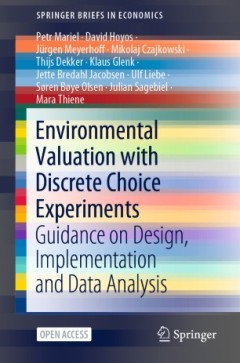
Environmental valuation with discrete choice experiments : guidance on design…
This open access book offers up-to-date advice and practical guidance on how to undertake a discrete choice experiment as a tool for environmental valuation. It discusses crucial issues in designing, implementing and analysing choice experiments. Compiled by leading experts in the field, the book promotes discrete choice analysis in environmental valuation through a more solid scientific basis …
- Edition
- -
- ISBN/ISSN
- 9783030626693
- Collation
- xiii, 129p. : ill.
- Series Title
- -
- Call Number
- 333.7 ENV e
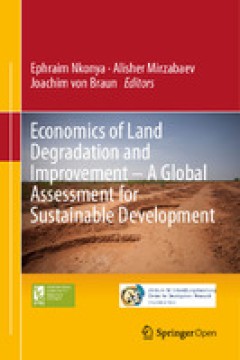
Economics of land degradation and improvement: a global assessment for sustai…
- Edition
- -
- ISBN/ISSN
- 9783319191683
- Collation
- xviii, 686p.: ill.
- Series Title
- -
- Call Number
- 333.7 ECO e
- Edition
- -
- ISBN/ISSN
- 9783319191683
- Collation
- xviii, 686p.: ill.
- Series Title
- -
- Call Number
- 333.7 ECO e
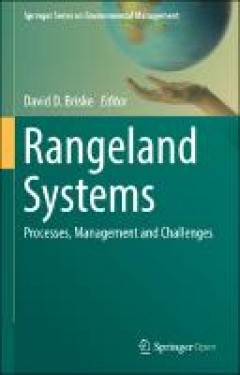
Rangeland systems: process, management and challenges
This book is open access under a CC BY-NC 2.5 license. This book provides an unprecedented synthesis of the current status of scientific and management knowledge regarding global rangelands and the major challenges that confront them. It has been organized around three major themes. The first summarizes the conceptual advances that have occurred in the rangeland profession. The second addresse…
- Edition
- -
- ISBN/ISSN
- 9783319467092
- Collation
- xv, 661p.: ill.
- Series Title
- -
- Call Number
- 577.4 RAN r
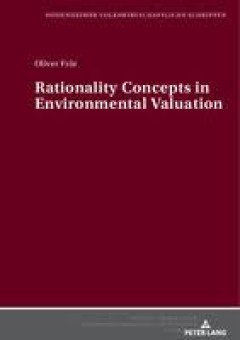
Rationality concepts in environmental valuation
Survey based valuation techniques like the Contingent Valuation Method (CVM) rely particularly on the premise of respondents’ rationality when answering willingness to pay (WTP) questions. Results of CVM surveys have repeatedly put this fundamental assumption into question. This study adopts a more realistic view of rationality accounting for respondents’ limited capacities to process infor…
- Edition
- -
- ISBN/ISSN
- 9783631573365
- Collation
- xvi, 239 p. : ill. ; 21 cm.
- Series Title
- Hohenheimer volkswirtschaftliche Schriften, Bd. 58
- Call Number
- 333.72 FRO r
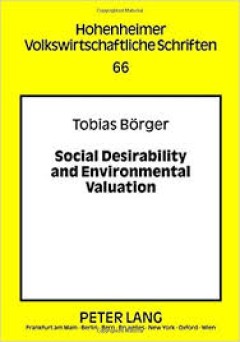
Social desirability and environmental valuation
Socially desirable responding (SDR) is an often-reported source of bias in survey interviews. It describes the tendency of a respondent to answer in a way that is socially desirable rather than to answer truthfully. This response bias also threatens the reliability and validity of survey-based environmental valuation techniques such as the Contingent Valuation Method (CVM). Therefore, the study…
- Edition
- -
- ISBN/ISSN
- 9783631632581
- Collation
- xiii, 252 p. : ill. ; 22 cm.
- Series Title
- Hohenheimer volkswirtschaftliche Schriften ; Bd. 66
- Call Number
- 333.7 TOB s
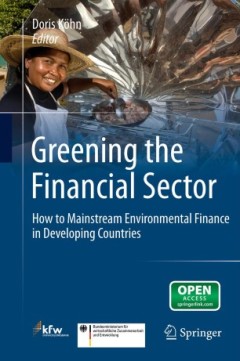
Greening the financial sector : how to mainstream environmental finance in de…
Given the manifold challenges of financial sectors in developing and transition countries, one might be tempted to believe that embarking on “green” finance is not a priority for financial systems development. However, there are a number of arguments against this view. Environmental finance, particularly energy efficiency and renewable energy (EERE) finance, can and should serve as an inter…
- Edition
- -
- ISBN/ISSN
- 9783642050879
- Collation
- xiv, 249p. : ill.
- Series Title
- -
- Call Number
- 332.1 GRE g
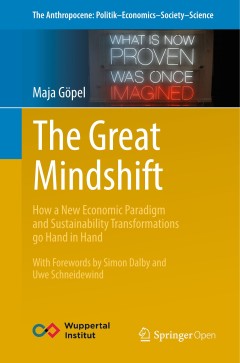
The great mindshift : how a new economic paradigm and sustainability transfor…
Sustainable development is the 21st Century’s wicked problem. After 40 years into this agenda have reversed only few unsustainable trends we hear the call for a paradigm shift, transformation, radical change or system innovations in order to finally change course. But what does this actually mean? And how do we put it into practice? This book describes the path ahead. It combines system tr…
- Edition
- -
- ISBN/ISSN
- 9783319437668
- Collation
- xxiii, 184p. : ill.
- Series Title
- -
- Call Number
- 338.927 GOP g
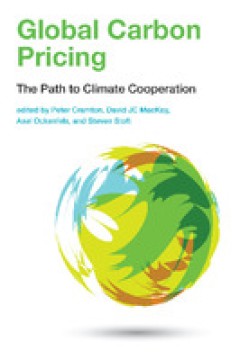
Global carbon pricing: the path to climate cooperation
Why the traditional “pledge and review” climate agreements have failed, and how carbon pricing, based on trust and reciprocity, could succeed.After twenty-five years of failure, climate negotiations continue to use a “pledge and review” approach: countries pledge (almost anything), subject to (unenforced) review. This approach ignores everything we know about human cooperation. In this …
- Edition
- -
- ISBN/ISSN
- 9780262036269
- Collation
- xvii, 252p.: ill.
- Series Title
- -
- Call Number
- 363.738746 GLO g
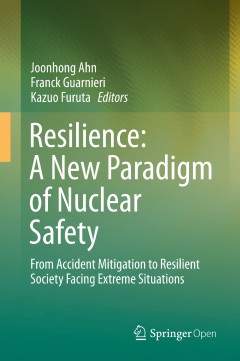
Resilience : a new paradigm of nuclear safety : from accident mitigation to r…
This book summarizes presentations and discussions from the two-day international workshop held at UC Berkeley in March 2015, and derives questions to be addressed in multi-disciplinary research toward a new paradigm of nuclear safety. The consequences of the Fukushima Daiichi nuclear accident in March 2011 have fuelled the debate on nuclear safety: while there were no casualties due to radiati…
- Edition
- -
- ISBN/ISSN
- 9783319587684
- Collation
- xvii, 356p. : ill.
- Series Title
- -
- Call Number
- 621.4835 RES r

Building a resilient and sustainable agriculture in Sub-Saharan Africa
What are the challenges and action points for agricultural sustainability in Sub-Saharan Africa? This collection of papers offers technical analyses, policy recommendations and an overview of success stories to date. Each carefully selected paper provides valuable insights for improved policy making and defines relevant strategic priorities on Africa’s sustainable transformation process, whic…
- Edition
- -
- ISBN/ISSN
- 9783319762227
- Collation
- xxviii, 302p. : ill.
- Series Title
- -
- Call Number
- 338.1 BUI b
 Computer Science, Information & General Works
Computer Science, Information & General Works  Philosophy & Psychology
Philosophy & Psychology  Religion
Religion  Social Sciences
Social Sciences  Language
Language  Pure Science
Pure Science  Applied Sciences
Applied Sciences  Art & Recreation
Art & Recreation  Literature
Literature  History & Geography
History & Geography